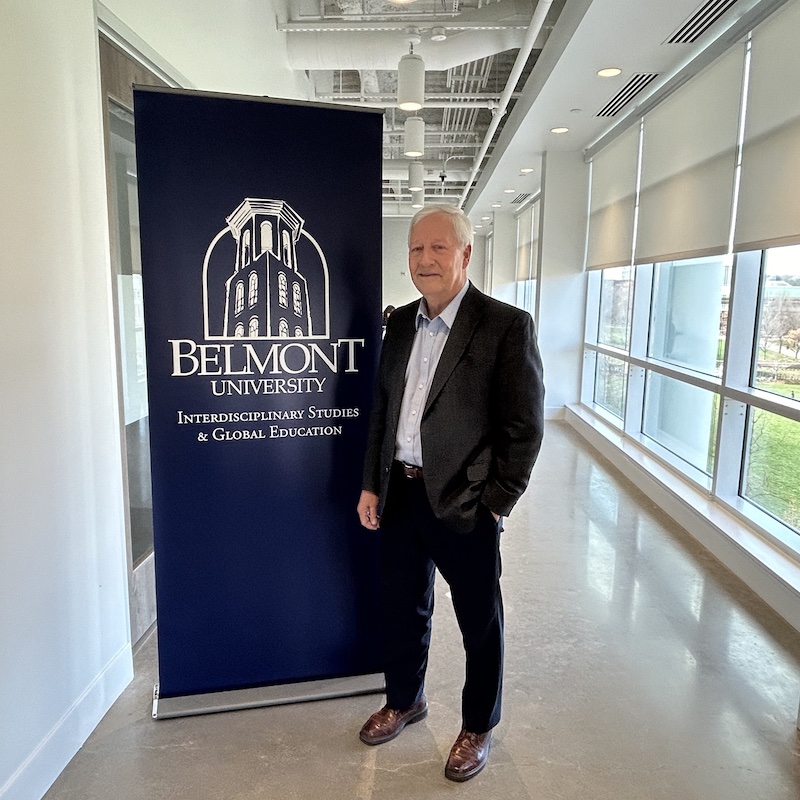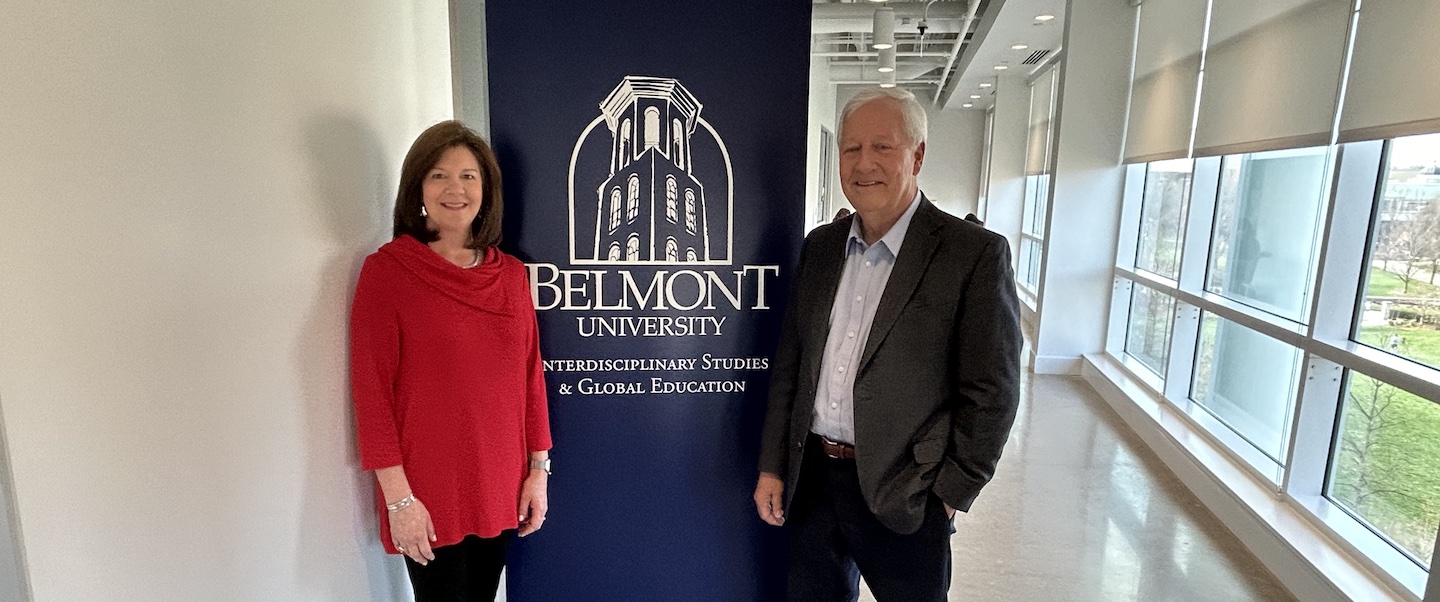Currently incarcerated students find instruction, inclusion and empowerment in Belmont’s prison education program
In January, President Emeritus Dr. Bob Fisher returned to the classroom after more than 25 years, noting, “Once you retire after being so intensely involved for so long, there’s this pause and you say, ‘Well, what now? Who can I serve now?’”
Fisher is finding an answer at the Turney Center Industrial Complex, Belmont’s off-campus instructional site that educates currently incarcerated men. This spring, he started teaching Practice of Leadership to 22 students at the Turney Center as part of the prison education program he initiated at Belmont in 2021, just before retiring as university president.
While several members of Belmont’s faculty have participated in various prison education programs over the years, Fisher was the catalyst for the prison education program at Belmont. A Bachelor of Business Administration (BBA) degree is offered to participants through the Tennessee Higher Education in Prison Initiative (THEI) and the Massey College of Business.
THEI provides holistic support to incarcerated scholars pursuing college programs in Tennessee prisons. Once they have earned their associate’s degree from Nashville State Community College, admitted students may pursue a major in professional general business and earn a BBA from Belmont.
 Some instructors, like Fisher, forego the program's fully online, asynchronous modality. Five sessions of Fisher’s course are recorded for the students to view online. For the remaining 11 sessions, Fisher travels 60 miles west, passes through five gates and walks the half-mile trek to the education center inside the complex to teach his students in person.
Some instructors, like Fisher, forego the program's fully online, asynchronous modality. Five sessions of Fisher’s course are recorded for the students to view online. For the remaining 11 sessions, Fisher travels 60 miles west, passes through five gates and walks the half-mile trek to the education center inside the complex to teach his students in person.
“Before my first class, I met with the warden and he said, ‘I really appreciate Belmont doing this program. A lot of these guys don't have a lot of reasons to hope.’ And I thought, that’s what Belmont offers, hope.”
This year, two currently incarcerated students from Belmont’s prison education program submitted essays that were selected as first and second place winners of the 15th annual Harry N. Hollis Student of Integrity Award Essay Contest hosted by the Edward C. Kennedy Center for Business Ethics.
“We often feel as if we are forgotten and ignored by the world around us,” second-place essayist Edward Odom said. “This acknowledgment affirms that we are still a constructive part of the world in some small way. A high-quality education from Belmont University is going to allow me to reenter society more prepared to thrive post-incarceration. The University experience has inspired me and built my confidence.”
The winners received cash awards: $1,000 for first place and $500 for second place. Each recipient has requested for their monetary award be sent to family members outside. Odom and first-place essayist David Richardson will be publicly acknowledged at the Massey College of Business awards presentation in April.
“I am out to prove a point. More so to the people who currently inhabit the same space as me, those currently incarcerated.... those struggling to find a reason to smile,” Richardson said. “The significance of having my essay selected for this contest is that it testifies that we can be heard, that people are listening and that our voice matters.”
Richardson is on a mission to reduce recidivism from within as the leader of the Brothers’ Helping Everyone Achieve Resilience Through Service (HEARTS) Initiative, an incarcerated-person led peer-to-peer mentoring program at the Turney Center.
Using his Belmont education, Richardson has made the Brothers’ HEARTS a sustainable entity at the Turney Center where young adult offenders are mentored by their older counterparts in a dedicated effort to depopulate the prison industrial complex through education and mentorship.
“With the skills that I am acquiring [as I take] the courses offered by Belmont, I am better able to lead this organization in its mission to eradicate recidivism from within,” Richardson said. “This confidence expends itself beyond my leadership duties into my personal life. I am a better, more effective communicator, a more active listener and a more open-minded person because of my Belmont education.”
Belmont’s Interdisciplinary Studies and Global Education (ISGE) caters to a diverse population of students including veteran and military-affiliated students, the global honors program and study abroad program, students earning an adult degree and students at the Turney Center.
“For us to be able to work in that space and to help yet another demographic and a different population is rewarding for us,” Assistant Director of ISGE Kim Powell said. “Everybody comes at different points in their lives and from different avenues, but they're all striving for the same thing. They all want that degree. They all want to be successful in life, no matter what that looks like for them.”
Higher education in prison is an effective tool for decreasing recidivism (the tendency of a previously incarcerated person to re-offend). The recidivism rate is less than 15% for people who enroll in more than one semester of college with THEI. This is a drastic comparison to Tennessee’s 46% recidivism rate reported by the Tennessee Department of Labor & Workforce Development in 2021.
Providing a degree for students at the Turney Center aligns with Belmont’s aspirational aim to reweave the social fabric, producing diverse leaders of character. Looking to the future, Belmont will graduate its first cohorts of students at the Turney Center in the spring of 2025.
“They have a choice about how to live the rest of their lives, even in that environment,” Fisher said. “They want to live it with meaning and purpose. When they walk out that door with a Belmont credential, it says a lot, especially in Nashville’s community, and it says a lot anywhere they go.”
Last year, THEI alumni, community and institutional partners, funders and foundation representatives and general community members gathered to raise over $104,000 at the THEI inaugural Path Forward Luncheon hosted at Belmont University. April 2, THEI will again host the ticketed luncheon at Belmont as it continues working to amplify the power of education through the eyes and voices of THEI partners and alumni.
Visit thei.org to learn ways to get involved.

